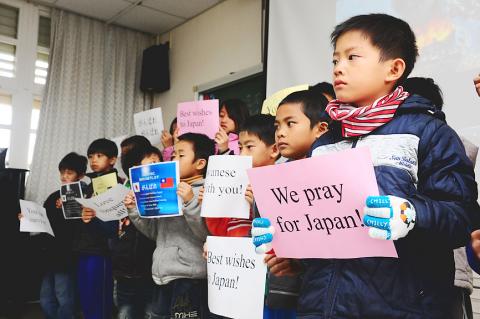Government officials yesterday admitted Taiwan was not fully prepared to deal with a natural catastrophe of the magnitude that hit Japan last Friday, killing thousands and sparking a series of malfunctions at a nuclear power station.
Amid concerns over the ability of authorities to respond to a similar situation, lawmakers across party lines asked the Ministry of the Interior and representatives from the Atomic Energy Council (AEC) and Taiwan Power Co to share their views on their preparedness at the legislature’s Internal Administration Committee.
However, the presentation by Minister of the Interior Jiang Yi-huah (江宜樺) raised more questions than it answered.

Photo: Tsai Tsung-hsien, Taipei Times
“Based on Japan’s evacuation plan, if nuclear emergencies occurred at the No. 1 and No. 2 nuclear power plants, we would have to evacuate residents in the Greater Taipei metropolitan area,” Democratic Progressive Party (DPP) Legislator Yeh Yi-jin (葉宜津) said, referring to the Jinshan Nuclear Power Plant in Shihmen District (石門), New Taipei City (新北市), and the Guosheng Nuclear Power Plant in Wanli (萬里), also in New Taipei City.
“Do we have any concrete evacuation plan in the event of an emergency?” Yeh asked. Those concerns were echoed by DPP Legislator Tien Chiu-chin (田秋堇) and Chinese Nationalist Party (KMT) Legislator Chi Kuo-tung (紀國棟).
Jiang said no such plan exists.
“In the event of such a nuclear emergency, we would make a step-by-step evacuation,” Jiang said. “However, for the moment, we don’t have an evacuation plan for the Greater Taipei metropolitan area, which includes Taipei, New Taipei City and Keelung.”
Chi asked how the government would deal with a worst case scenario, such as a massive earthquake triggering a nuclear crisis and damaging the 37 bridges connecting Taipei to New Taipei City, thus blocking major traffic gateways out of Taipei.
Again, the answer was that the government did not presently have a strategy for dealing with such a situation.
Yeh asked whether the ministry had standardized procedures for dealing with an earthquake-triggered nuclear crisis.
Under the law, the ministry would be in charge of dealing with the aftermath of an earthquake, while the AEC would be responsible for handling a nuclear crisis.
Jiang said both agencies had yet to discuss how such coordination would work, but he promised to discuss the matter with the council as soon as possible.
“The law stipulates that the AEC should set up an emergency operations center if an emergency occurs at a nuclear power plant, while a central emergency operation center would deal with earthquakes, typhoons or tsunamis,” Jiang said. “However, as to what would happen if a nuclear crisis were triggered by an earthquake or tsunami … the law is not very clear.”

ENDEAVOR MANTA: The ship is programmed to automatically return to its designated home port and would self-destruct if seized by another party The Endeavor Manta, Taiwan’s first military-specification uncrewed surface vehicle (USV) tailor-made to operate in the Taiwan Strait in a bid to bolster the nation’s asymmetric combat capabilities made its first appearance at Kaohsiung’s Singda Harbor yesterday. Taking inspiration from Ukraine’s navy, which is using USVs to force Russia’s Black Sea fleet to take shelter within its own ports, CSBC Taiwan (台灣國際造船) established a research and development unit on USVs last year, CSBC chairman Huang Cheng-hung (黃正弘) said. With the exception of the satellite guidance system and the outboard motors — which were purchased from foreign companies that were not affiliated with Chinese-funded

PERMIT REVOKED: The influencer at a news conference said the National Immigration Agency was infringing on human rights and persecuting Chinese spouses Chinese influencer “Yaya in Taiwan” (亞亞在台灣) yesterday evening voluntarily left Taiwan, despite saying yesterday morning that she had “no intention” of leaving after her residence permit was revoked over her comments on Taiwan being “unified” with China by military force. The Ministry of the Interior yesterday had said that it could forcibly deport the influencer at midnight, but was considering taking a more flexible approach and beginning procedures this morning. The influencer, whose given name is Liu Zhenya (劉振亞), departed on a 8:45pm flight from Taipei International Airport (Songshan airport) to Fuzhou, China. Liu held a news conference at the airport at 7pm,

Taiwan was ranked the fourth-safest country in the world with a score of 82.9, trailing only Andorra, the United Arab Emirates and Qatar in Numbeo’s Safety Index by Country report. Taiwan’s score improved by 0.1 points compared with last year’s mid-year report, which had Taiwan fourth with a score of 82.8. However, both scores were lower than in last year’s first review, when Taiwan scored 83.3, and are a long way from when Taiwan was named the second-safest country in the world in 2021, scoring 84.8. Taiwan ranked higher than Singapore in ninth with a score of 77.4 and Japan in 10th with

Authorities yesterday elaborated on the rules governing Employment Gold Cards after a US cardholder was barred from entering Taiwan for six years after working without a permit during a 2023 visit. American YouTuber LeLe Farley was barred after already being approved for an Employment Gold Card, he said in a video published on his channel on Saturday. Farley, who has more than 420,000 subscribers on his YouTube channel, was approved for his Gold Card last month, but was told at a check-in counter at the Los Angeles International Airport that he could not enter Taiwan. That was because he previously participated in two